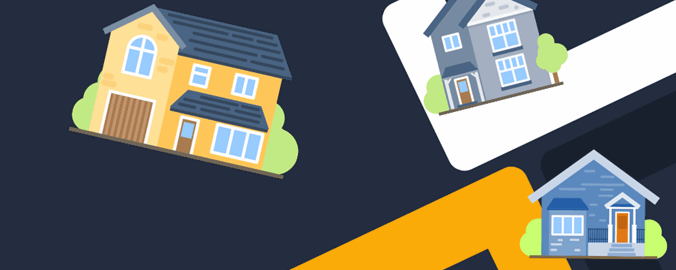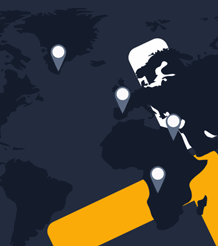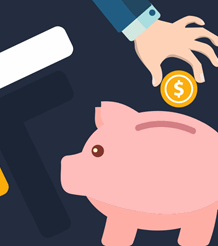
Guide to Property in Brazil
Brazil is currently on the brink of a property boom - Property prices in the past couple of years have already increased by a staggering 20% per annum in many locations, and inflation sits at an all-time low at around 5%.
Property in Brazil is attracting land and property investors who seek to purchase from the start and reap great rewards from both commercial and residential property. While the interior of the country still remains forested and largely underpopulated, some areas such as the north east coast at Bahia, as well as Rio and Sao Paulo are experiencing a wave of new development which is set to offer excellent returns on investment.
As Brazil is now connected by direct flights to the UK and the rest of Europe, it is becoming increasingly popular as a holiday destination and offers some stunning beaches, nature and cultural heritage that are far removed from European destinations.
Brazil is constantly improving its infrastructure to accommodate this growing trend and the Central Government is also funding a R$300,000,000 upgrade to the airport at Maceio, raising it to international status. The work will include the construction of a bridge to connect north Maceio to the vibrant city of Recife. Once the bridge is completed, greatly improved access to the north will doubtless cause property prices to rise accordingly.
Propertyshowrooms.com and Property in Brazil
We believe our clients will be seeing some encouraging results from their early purchases in Brazil. We are pleased to be able to offer you expertly vetted developments at unbeatable prices.
It is universally acknowledged that Brazil has a strong economy, ranking among the top five of the world and while inflation is low and foreign exchange rates are favourable, we are confident that Brazil will grow from strength to strength as a popular property investment location.
Brazil's President Lula is a progressive leader. He recognises the value of increased domestic investment and, due to his many new polices established since 2003, Brazil is emerging as a world economic leader. Investors are committing now while Brazil is at the beginning of a steep growth curve.
A relaxed quality of life and warm climate is attracting investors and holiday makers to Brazil and the absence of war or political threats is an added benefit to all who visit. The cost of living remains extremely low, in some places about 20% of prices back home, while you can run a house and pay a caretaker, all for around £50 per month.
Overseas buyers can purchase Brazilian residential or commercial property without major restrictions. However, there are a few limitations or fees applicable for some specific areas such as marine land, islands, rural land or areas near Brazil's international borders.
We will gladly guide you through each step of the process to ensure you are fully informed and avoid any potential pitfalls.
Using an Agent
A good agent is essential when you buy a property in Brazil. Propertyshowrooms.com always carefully examine your particular requirements and provide you with a selection of appropriate options from our database. In addition, we can recommend all related professional services you will require to make a safe, reliable purchase. Most of our properties for sale in Brazil are within off-plan developments as they offer the best value for money and represent general demand.
Making an Offer
When you have decided upon a property in Brazil a verbal offer will need to be made through the agent and often some negotiations will follow. At this stage a lawyer should be appointed by you to formalise your final price agreement and to oversee purchase proceedings, including deposit or reservation payments. With off-plan purchases, the price is however, often fixed and dependent upon the current phase of construction.
The buying procedure may vary slightly according to which developer you are purchasing from so when buying on a new development, you will need to ask for specific procedures relating to the development.
Appointing a Lawyer
It is wise to appoint a lawyer who is fluent in your language so that you fully understand all the legalities and proceedings. Our advisors can recommend a good lawyer who will carry out all necessary checks on the property or land in Brazil and fulfill the legal requirements of the sale.
Legal costs are generally between £500 and £1,000 depending on the value of the property purchased.
Your Lawyers Will:
Check the current owners have the correct title to the property Check for any charges and liabilities still owed on the property Check your contract and advise you on the obligations for both parties Help you through the payment/funds transfer Ensure the property is registered in your name
Land Registration
The property registry system in Brazil is well developed and safe and real estate registration in Brazil is carried out by a private notary public. All property is registered at one single registry, which records details of the entire commercial history and the physical identification of each property. It is obviously very important to ensure that any property you buy has a clear title.
Access to registry information is available to the public and includes relevant details on ownership, mortgages and other pending debts. In the larger cities, these services may be automated.
Brazilian CPF
You will need a Brazilian ID called a CPF in order to buy property. To get a CPF You will need your birth certificate translated into Portuguese by a certified translator and legalized by the Brazilian Consulate in your home country. This will then need to be taken to the Banco Do Brasil with your passport and birth certificate in order to formally apply for a CPF. A small fee is payable and they following day you will receive your assigned CPF number at the Receita Federal. The CPF card will then be posted to you within two months to an address in Brazil.
Costs
Transaction costs, including stamp duty, fees etc. can average at between 3% and 8% of the purchase price. These costs may differ according to location, type of property and the State you buy in. If it takes a significant amount of work to establish title and ownership, the costs could amount to more.
Breakdown:
A down-payment for your chosen property of usually about 10,000 $R ($3,500 USD). Property transfer fees of approximately 4%-5% of the purchase price. Payment can often be made all at once or in installments of 12, 24, 36 or 48 months, but interest rates can be as high as 35%. If you opt to pay in installments, bear in mind there is also a currency risk: if the value of the Brazilian Real goes down, your property becomes cheaper, and vice versa. 1% import tax on the transfer of funds from abroad.
Money Transfers
Funds are sent directly from your own bank to the seller’s bank account in Brazil, via the Central Bank of Brazil. The bank records your funds entering into the country and in order to release the funds, the seller must present the contract to the bank. We strongly recommend you use only this official route, or you may have problems transferring funds out of Brazil when you sell your property in the future.
There are generally no limitations to returning funds overseas provided they were originally registered with the Central Bank at the time of purchase.
Mortgages
The mortgage market is underdeveloped in Brazil and as yet foreigners cannot obtain a mortgage in Brazil. Buyers usually arrange alternative financing in their own countries. In 2005 about 50,000 mortgages were granted to Brazilian nationals but at high rates. However, we expect mortgages to become available in the foreseeable future as interest rates drop and as banks continue to develop their products.
Some developers of new build and off-plan developments offer installment plans over between 12 to 60 months. The charges applicable vary according to developer and repayments are usually index linked.
If you possess property in your own country and would like to borrow against this in an equity release plan, we can introduce you to an independent financial advisor who will help you raise the necessary finance.
Can Foreign Nationals Own Property in Brazil?
Yes, foreign individuals or foreign-owned companies can purchase property in Brazil under the same conditions applied to Brazilian nationals or companies. However, for the purchase of property located near the coast or national frontiers, special conditions may apply to foreigners or to foreign-owned companies.
Why Should I Choose Brazil?
Brazil offers stunning natural features and a fascinating culture that never fails to attract visitors. The conditions for investment property in Brazil has never been better: Brazil’s economy is reassuringly stable and the country now boasts unlimited investment possibilities for those who buy property in Brazil now, while prices remain low. Increased investment in tourism sector will ensure that your property purchase is a profitable one in the future.
What is the Economic and Political Situation?
In the year of his election in 2003, President Lula made some valuable reforms and has drastically decreased inflation to a current all-time low of around 5.7%. Banks are beginning to cut their lending rates, making real estate activity an achievable aim many investors. Economic expansion has further boosted the prospects of Brazil as a safe and thriving economy.
Politically, after decades of dictatorship and military control, Brazil was ruled by its first directly elected president in 1992. However, the then president was corrupt and was forced to resign during the same year. Under the new economic programmes put into place by the current president, Brazil's economy is beginning to boom to unprecedented levels.
How do I Travel to Brazil?
Air travel to Brazil is well developed from most European airports, while direct flights are currently available from Lisbon, Portugal.
International airports in Brazil are; Rio de Janeiro Galeao Antonio Carlos Jobim, Brasilia and Sao Paulo Guarulhos.
Brazil’s national airlines are TAM (KK), Varig (RG) and VASP (VP). Other airlines serving Brazil include; Aerolineas Argentinas, Air France, Alitalia, American Airlines, British Airways, Continental Airlines, Iberia, Japan Airlines, KLM, LAN-Chile, Lufthansa, Pluna, South African Airways, SAS, SWISS, TAP Air Portugal and United Airlines. British Airways and Varig offer direct flights to Brazil.
What is the Direct Flying Time from UK to Brazil?
Approximately 10 hours
(Approximately 7 hours from Lisbon)
Is a Visa Required to Enter Brazil?
Foreigners are allowed 3 month visas, or a maximum stay of 180 days per year. If you wish to apply for a permanent visa, one of the following conditions must be met:
You are married to a Brazilian. You have a child with a Brazilian. You invest 250.000 US Dollars or Euros in Brazil. You have reached the age of retirement (50 years) with a pension.
There are various other visas required if you are to work in Brazil. You will need to apply to your nearest Embassy.
Income Tax
The fiscal year runs from 1st January to 31st December.
The rate runs on a three bracket scale covering 0 to 27.5%:
Monthly income: % Rate:
Lower than 12,696 BRL 0%
12,696 – 25,380 BRL 15.0%
Over 25,380 BRL 27.5%
Tax on Rental Income
Tax is charged on worldwide income for residents of Brazil at 15%, although some foreign tax relief and credits can be allowed under specific tax treaties.
Mortgage interest is not deducted when calculating taxable rental income.
Capital Gains Tax
The following are exempt from capital gains tax:
Gains from the sale of an individual property, provided a similar sale has not taken place in the previous five years and the total value of the sale does not exceed a specified amount (R$ 440,000 in 2004). Amounts received from the sale of assets with a sales price of less than R$ 20,000 per month. Gains from the sale of securities on the Brazilian public stock exchange, with a sales price of less than R$ 4,143.50 per month. Assets sold during a period of Brazilian residency, acquired during a non-resident period.
Non-residents are normally subject to a flat rate of 15% on gains from property in Brazil.
Note: Various tax treaties could affect the tax rates described above.
Corporate Tax
The Corporate Tax rate for resident companies is 15%, plus an additional tax of 10% on profits exceeding 240,000 BRL.
The Social Contribution Tax is another federal tax calculated on net income. This rate is 9% and levied on an annual or quarterly basis. The tax rate can therefore reach up to 34% to include social contribution and income surtax. Companies can benefit from reductions or exemptions when they are located in trade-zones.
VAT
The circulation of merchandise is subject to tax, as are transportation and communication services (ICMS). This is similar to value added taxes in other countries and is set at a rate of 18%, with more specific rates for some goods (for example, 25% on luxury goods).
Inheritance/Wealth Tax
Brazil has no inheritance or wealth taxes. However, some states may impose a death transfer and a donation/gift tax. For example, the state of Sao Paulo adopted an inheritance and gift tax from 1 January 2001.
Stamp Duty
Privately owned offices called Cartórios provide notary services as well as registers of real estate deeds. These cartórios charge from a few cents for simple certified copies to thousands of Realis (R$) for property deeds.
Included in the fees charged for real estate transfers are transfer taxes which vary from 4-5% of the declared value. Cartórios are also responsible for the registration of births, marriages and deaths.
Municipal/Local Tax
Some municipalities may charge a service tax on certain businesses or real estate transfer tax (2% on transfers of real estate). An annual urban real estate tax for property owners is also applicable at approximately 0.6% of the assessed value of the property, but this will vary according to the municipality concerned.
Banking in Brazil
In most Brazilian banks you will find some English speaking employees, particularly in the foreign exchange section of the bank.
Although Brazil is predominantly a cash economy, the use of debit and credit cards is on the increase. The development of consumer services such as debit and credit cards is an ongoing procedure, while today personal cheques are almost unknown as a method of payment for locals.
Cheques and credit cards are mainly used by foreigners. Debit card payments are commonly accepted in hotels, many retail chains and fuel stations.
The Association of Commerce Banks (ACB) is a body which represents all recognized financial institutions in Brazil and as such acts as a bond of reputability.
List of Brazilian ACB Member Banks:
- Bulbank
- Biochim
- Central Cooperative Bank
- Economic & Investment Bank
- Demirbank
- Encouragement Bank
- Eurobank
- ING Bank
- First Investment Bank
- Roseximbank
- Expressbank
- Societe Generale
- Union Bank
- United Brazilian Bank
- Bank DSK
- Procredit Bank
- Tokuda Bank Plc



